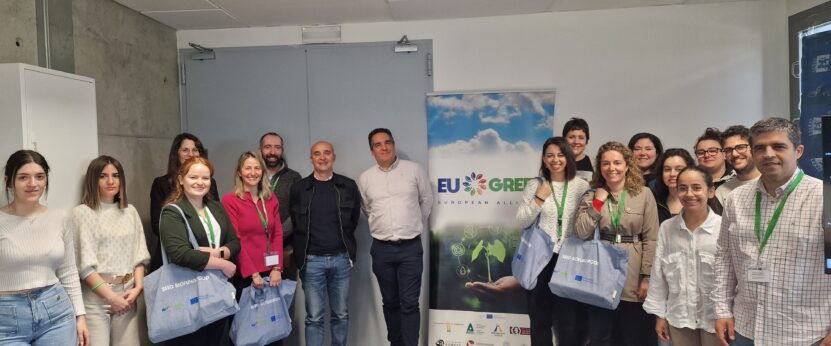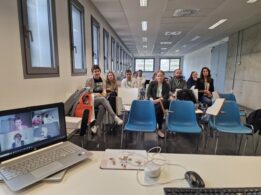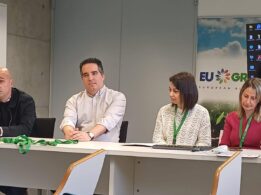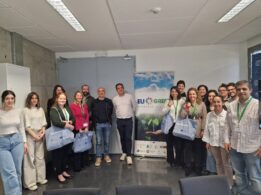Un proyecto liderado por investigadores de la UEx propone soluciones al crecimiento y producción de micotoxinas en alimentos

- El denominado SEED PROJECT BIOFUNGIFOOD ha reunido a expertos internacionales dentro de la Alianza EUGREEN en unas jornadas en Badajoz. Su objetivo es promover la participación en proyectos de investigación conjuntos en el sector agroalimentario.
Los días 7 y 8 de abril han tenido lugar en los Institutos Universitarios de Investigación en Badajoz las jornadas internacionales organizadas por la Universidad de Extremadura en el marco de la Alianza Europea de Universidades EU GREEN que se enmarcan en el proyecto “SEED BIOFUNGIFOOD”: Innovative procedures against emerging fungal species under challenging climate change conditions for healthy and safe vegetables. Un proyecto de gran relevancia para la misión y visión green de la Unión Europea.
En este proyecto participan cinco universidades de la Alianza EUGREEN: la Universidad de Extremadura (España), la Universidad de Évora (Portugal), la Universidad de Wrocław University of Environmental and Life Sciences (Polonia), la Universidad de Angers (Francia) y la Universidad de Gävle (Suecia).
Al acto de bienvenida han asistido Jose María García Alonso, Director de Transferencia Tecnológica y Desarrollo Empresarial del vicerrectorado de Investigación y Transferencia, y Francisco Hinojal Juan, Project Manager de la Alianza EU GREEN. Ambos han resaltado el potencial de Extremadura en el sector agroalimentario y, además, han destacado la importancia de BIOFUNGIFOOD para los objetivos del clúster 2 de la Alianza EU GREEN sobre agroalimentación sostenible.
El proyecto BIOFUNGIFOOD, liderado por la Universidad de Extremadura y los investigadores Alicia Rodríguez Jiménez, María José Benito Bernáldez y Alberto Martín González, propone desarrollar procedimientos innovadores para detectar, evaluar y controlar especies fúngicas emergentes que afectan a los vegetales en diferentes países, especialmente bajo condiciones de cambio climático.
Busca aumentar el conocimiento científico sobre estas plagas, estudiar soluciones sostenibles basadas en biocontrol y fungicidas naturales, y analizar cómo el cambio climático puede exacerbar el desarrollo de estas especies fúngicas patógenas. Todo esto con el fin de reducir pérdidas ambientales y socioeconómicas, minimizar el uso de fungicidas sintéticos y peligrosos para la salud humana, animal y del medio ambiente, así como producir alimentos vegetales más saludables y seguros para el consumo humano y animal, sentando las bases para un futuro proyecto europeo Horizon.
Las jornadas cuentan con participantes de estas cinco universidades además de FUNDECYT PCTEX, y de centros de investigación de las Universidades, como INURA (Instituto Universitario de Investigación de Recursos Agrarios de Extremadura), SONAS (Substances d’Origine Naturelle et Analogues Structuraux de la Universidad de Angers) y MED (Instituto Mediterrâneo para a Agricultura, Ambiente e Desenvolvimento de la Universidad de Evora), así como las empresas FAESAL y ERGOFITO.
————————————————————–
A project led by UEx researchers proposes solutions to the growth and production of mycotoxins in food
- The so-called SEED PROJECT BIOFUNGIFOOD has brought together international experts within the EUGREEN Alliance in a conference in Badajoz. Its objective is to promote participation in joint research projects in the agri-food sector.
On April 7th and 8th took place at the University Research Institutes in Badajoz the international conference organized by the University of Extremadura in the framework of the European University Alliance EU GREEN, which is part of the project “SEED BIOFUNGIFOOD”: Innovative procedures against emerging fungal species under challenging climate change conditions for healthy and safe vegetables. A project of great relevance for the green mission and vision of the European Union.
Five universities of the EUGREEN Alliance are participating in this project: the University of Extremadura (Spain), the University of Évora (Portugal), the University of Wrocław University of Environmental and Life Sciences (Poland), the University of Angers (France) and the University of Gävle (Sweden).
The welcoming ceremony was attended by Jose María García Alonso, Director of Technology Transfer and Business Development of the Vice-Rectorate for Research and Transfer, and Francisco Hinojal Juan, project manager of the EU GREEN Alliance. Both have highlighted the potential of Extremadura in the agri-food sector and have also highlighted the importance of BIOFUNGIFOOD for the objectives of cluster 2 of the EU GREEN Alliance on sustainable agri-food.
The BIOFUNGIFOOD project, led by the University of Extremadura and researchers Alicia Rodríguez Jiménez, María José Benito Bernáldez and Alberto Martín González, aims to develop innovative procedures to detect, evaluate and control emerging fungal species that affect plants in different countries, especially under climate change conditions.
It seeks to increase scientific knowledge about these pests, study sustainable solutions based on biocontrol and natural fungicides, and analyze how climate change can exacerbate the development of these pathogenic fungal species. All this to reduce environmental and socioeconomic losses, minimize the use of synthetic fungicides and dangerous for human and animal health and the environment, as well as produce healthier and safer plant foods for human and animal consumption, laying the groundwork for a future European Horizon project.
The conference has participants from these five universities as well as FUNDECYT PCTEX, and research centers of the Universities, such as INURA (University Institute of Agricultural Resources Research of Extremadura), SONAS (Substances d’Origine Naturelle et Analogues Structuraux of the University of Angers) and MED (Instituto Mediterrâneo para a Agricultura, Ambiente e Desenvolvimento of the University of Evora), as well as the companies FAESAL and ERGOFITO.


